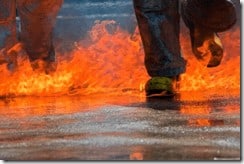It’s horrible thinking about what you’d do if your family home caught fire – destroying your house and your possessions. But part of being a responsible parent is acknowledging risks and doing your best to protect your family. And while this means taking fire prevention measures around the home to stop fire breaking out, it also means making provisions and knowing what to do if a fire does strike. Follow these steps and you’ll be able to rest assured that your family is protected.
Install a Smoke Alarm
If a fire does strike in your home, a fire alarm is essential for getting your family out of danger as quickly as possible. According to the Fire Service, if your house doesn’t have a smoke alarm, you’d be twice as likely to die in a fire.
To protect your family from fire, it’s essential to have at least one smoke alarm on each floor. However, it is preferable to have one in every bedroom. Most smoke alarms last for ten years but if you’re not sure how old your smoke alarm is, it’s time to replace it. Smoke alarms should be regularly tested and you can do this by pressing the button until the alarm sounds. If you have any elderly relatives, check they have fire alarms installed and regularly test them.
Take Care When Cooking
 According to the UK Fire Service, chip pan fires in kitchens cause one fifth of all accidental house fires. But that doesn’t mean you should stop frying your family’s chips; it just means you should make sure you do it safely. You can do this by following the Fire Service’s chip pan safety advice.
According to the UK Fire Service, chip pan fires in kitchens cause one fifth of all accidental house fires. But that doesn’t mean you should stop frying your family’s chips; it just means you should make sure you do it safely. You can do this by following the Fire Service’s chip pan safety advice.
For example, when you’re cooking chips, never fill the chip pan more than a third full of oil. And if you can, use a thermostatically controlled deep fat fryer to avoid the oil overheating; with a normal chip pan you’ll know the oil is hot enough when you drop a piece of potato in and it starts to crisp. Most importantly you should never leave a chip pan – or anything else you’re cooking – unattended when the doorbell or the phone rings.
And if a chip pan fire does start, remember to NEVER throw water on the fire as this can cause the oil to explode. The safest way to put out a chip pan fire it to place a damp tea towel over the pan or wait for the fire brigade.
Take Out a Home Insurance Policy
Sometimes you can do all you can to prevent a fire but that won’t stop one breaking out anyway. While the chances of this happening are low if you take the necessary fire safety precautions, you should still safeguard your home with a comprehensive house insurance policy just in case the worst happens.
Home insurance from DNA can be broken down into two categories: buildings and contents insurance. Buildings insurance covers the cost of repairing your house’s bricks and mortar, roof, structure and some of its fittings. Contents insurance, however, covers all your moveable items, such as furniture and possessions.
If you rent your home, your landlord will be responsible for taking out buildings insurance and you will be responsible for arranging contents insurance. However, if you own your own home, you will need to take out both yourself. When you take out DNA insurance against fire, flood and burglary to protect your building and contents, it also provides you with alternative accommodation while your home is being repaired. Having a good home insurance policy gives you the peace of mind that your home and family are protected against all eventualities – no matter how big or small the risk.


